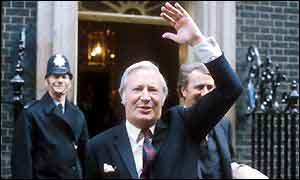|
Edward Heath:
1970 victory prompted EEC entry talks
Monday, 1 January, 2001, 00:39 GMT
UK downplayed sovereignty in Euro talks
|
 |
Documents disclosed under the 30-Year Rule reveal that
the most controversial European issue of today - monetary
union - was already being discussed at the highest levels
of government in 1970 as the UK sought entry to the club.
When Edward Heath took power in June 1970, everyone knew
that his main foreign policy goal was to succeed where
Harold Wilson before him had failed, and gain a place
for the UK in the European Economic Community.
The UK's attempts to join the European project had twice
been brushed aside by the then six-strong community. But
by 1970 the way appeared open.
Implications
Joining the Common Market, as it then was, had significant
implications for Parliament and the UK's wider relationship
with the Commonwealth nations.
But government papers disclosed for the first time reveal
that the new Conservative prime minister's view was to
get in, and get in fast.
PREM 15/62: Highlighted sovereignty issues
In July 1970, a memo to the prime minister from a cabinet
office official put the point clearly.
"The longer these negotiations drag on, the less
their prospect of success and the whole process is brought
into public disrepute," wrote the official.
But crucially, the document indicated how officials were
already thinking - and warning the politicians of the
battles that could lie ahead.
"It may become necessary to project, some picture
of the future development of the Community, if only because
the very absence of such a picture gives rise to fears
of the (supranational) unknown that are even now being
exploited."
And in a hand-written note on top of the memo to Mr Heath,
an official added: "Prime Minister, the ore important
point is perhaps to consider whether we are equipped to
think beyond the current "grocer's shop" stage.
We ought to give forethought to the implications for
the political institutions and sovereignty."
In an interview for the programme, Sir Edward Heath said
that as negotiations began, he saw problems in the UK
losing momentum.
"The problem is explaining to the public the intricacies
of joining another organisation which has had many years
in building up its structure.
"They were not going to change their structure to
take us in."
"Their attitude towards us"
But how were the other members regarding the UK's approach
for membership?
FCO 30/770: Embassy advised on strategy
The UK's then ambassador in Paris, Christopher Soames
(later Lord Soames), had a good idea of the French view,
according to disclosed documents. "We must not underestimate
the impact which the Government's handling of the issues
at home will have upon negotiations," he wrote to
Foreign Secretary Sir Alec Douglas-Home.
"What has puzzled and dismayed French public opinion
is the fact that so little has been done to far to try
to evoke real enthusiasm in Britain for of Europe."
The ambassador said that the French saw the British (and
particularly the previous Labour government) as being
obsessed with the costs of entry.
"The figure we have cut so far is less that of a
people determined to board the European train than that
of a somewhat nervous passenger on the platform whose
skirt has somehow got caught up in the door."
Difficulties at home
While Paris was urging an enthusiastic and visonary approach,
domestic political considerations pulled the government
in another direction.
Ministers and officials concurred that the negotiating
stance had to avoid appearing too enthusiastic and "insufficiently
hard-headed".
So was the government deliberately playing down future
issues such as monetary union?
PREM 410/4: Werner Plan known to ministers
At the negotiating table, they could hardly be avoided
as Brussels had already devised what became known as the
Werner Plan, a proposal for monetary union. According
to the senior British officials who saw it, the plan "could
imply the ultimate creation of a European federal state
with a single currency.
"It will arouse strong feelings about sovereignty
and provoke vigorous discussions."
"Everyone wanted to approach these monetary issues
with extreme caution and the less they came out in the
open, the better," Sir Crispin Tickell, one of the
UK's negotiators at Brussels, told UK Confidential.
"But the argument in London was don't let's talk
about this in public because we don't know what effects
it would have on sterling.
"In other words the bread and butter issues are
appropriate for a negotiation of this kind and when we're
in, then we can discuss the longer-term questions."
For his part, Sir Edward Heath rejects suggestions that
the government deliberately buried the prospect of monetary
union as "propaganda".
"When I first negotiated with Harold Macmillan as
prime minister, in my opening speech I said that our purpose
was to join a community which was going to be full.
"I emphasised that the first part is not the question
of trade and goods but the nature of the relationship
between the countries and this was to be wholehearted.
"I've emphasised that point in every speech I've
made."
Different course of action
And yet the same leading civil servants who predicted
possible fallout from public discussion of Werner, proposed
a different course of action.
"It will continue to be advantageous to HMG to avoid
taking any attitude on the detail of the Werner proposals,"
they advised. In other words, don't say unless your asked.
But, speaking today, Sir Edward said that his government's
approach to entering the EEC was less about pulling the
wool over the eyes of the British public, and more about
the pragmatic benefits of gaining entry and taking a stake
in Europe's future.
"Sovereignty is something you can use for your own
good," he told UK Confidential.
"By putting our share of sovereignty into the Community,
we are able to share in all its benefits, otherwise we
couldn't.
"The other members put their share of sovereignty
into the community as well and we share that."
|